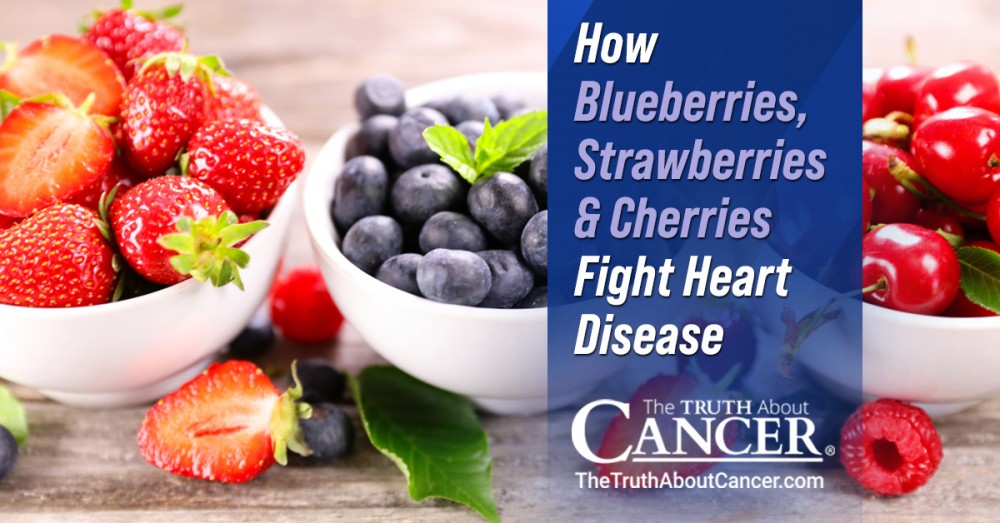In the realm of heart health, nature often holds the key to profound solutions. Recent research has shed light on the remarkable benefits of incorporating certain fruits and vegetables into our diets, particularly blueberries, strawberries, cherries, and their vibrant counterparts. These colorful edibles don’t just tantalize the taste buds; they serve as potent allies in the fight against inflammation and heart disease.
The Power of Blueberries
Blueberries, with their rich hue and bursting flavor, are more than just a delightful addition to breakfast bowls and desserts. Blueberries are packed with antioxidants, particularly flavonoids like anthocyanins, and possess potent anti-inflammatory properties. Studies have shown that regular consumption of blueberries can significantly reduce inflammation markers, which play a pivotal role in the development of heart disease.
Moreover, blueberries’ high levels of anthocyanins have been linked to improved cholesterol levels and enhanced arterial function, both critical factors in maintaining cardiovascular health. By bolstering vascular integrity and mitigating oxidative stress, blueberries emerge as a superfood for heart wellness.

Strawberries: Nature’s Heart Guardians
In the realm of heart-healthy fruits, strawberries reign supreme. These luscious berries are brimming with vitamins, minerals, and antioxidants, making them a formidable weapon against heart disease. Research suggests that the flavonoids in strawberries can dilate blood vessels, improve blood flow, and reduce the risk of blood clot formation, lowering the likelihood of cardiovascular events like heart attacks and strokes.
Furthermore, strawberries boast high levels of vitamin C, fiber, and potassium, all of which contribute to heart health by regulating blood pressure, supporting proper cardiac function, and promoting healthy cholesterol levels. Incorporating strawberries into your daily diet can be a delicious and effective strategy for fortifying your heart’s defenses.
Cherishing Cherries for Heart Health
Cherries, with their tangy-sweet taste and vibrant color, offer more than just culinary allure; they are a nutritional powerhouse with profound implications for heart health. Rich in antioxidants like anthocyanins and quercetin, cherries possess potent anti-inflammatory properties that can help alleviate oxidative stress and protect against heart disease.
Studies have indicated that regular consumption of cherries may lower C-reactive protein (CRP) levels, a key marker of inflammation linked to cardiovascular ailments. Additionally, the natural compounds found in cherries have been shown to reduce blood pressure, improve cholesterol profiles, and enhance overall vascular function, thereby conferring substantial benefits for heart health.
Research Corroborates the Link
The latest findings corroborate previous research, as outlined in a study recently published in Circulation. This study, which tracked 93,600 women, unveiled a significant correlation between a high consumption of flavonoid-rich foods like berries and a decreased risk of heart attacks.
The research revealed that women who incorporated more than three servings of blueberries and strawberries into their weekly diet exhibited a lower likelihood of suffering a heart attack compared to those who consumed fewer servings.
The key to berries’ heart-protective effects lies in their abundant anthocyanins, a specific type of flavonoid responsible for their vibrant hues. Flavonoids are antioxidants found in various foods such as berries, wine, chocolate, and tea.
Anthocyanins are predominantly found in fruits and vegetables with deep red, blue, and purple hues, including berries. And here’s the key: Anthocyanins have demonstrated the ability to enhance blood vessel function and reduce blood pressure, thereby impeding the accumulation of arterial plaque, a primary trigger for heart attacks.
Embracing a Rainbow of Fruits and Vegetables
While blueberries, strawberries, and cherries stand out as star players in the fight against heart disease, they are but a few members of nature’s diverse bounty. A colorful array of fruits and vegetables, including leafy greens, citrus fruits, apples, and bell peppers, offer an abundance of nutrients and phytochemicals that promote cardiovascular wellness.
By embracing a diet rich in fruits and vegetables of varied hues, individuals can harness the collective power of nature’s offerings to combat inflammation, reduce oxidative stress, and safeguard heart health. Whether enjoyed fresh, blended into smoothies, or incorporated into savory dishes, these plant-based treasures offer a delectable pathway to a heart-healthy lifestyle.
In conclusion, the profound impact of blueberries, strawberries, cherries, and other fruits and vegetables on inflammation and heart disease cannot be overstated. By incorporating these nutritional powerhouses into our daily diets, we can nourish our bodies, fortify our hearts, and embark on a journey toward lasting cardiovascular wellness. Let nature’s vibrant palette be your guide to a heart-healthy life.



















Leave a Reply